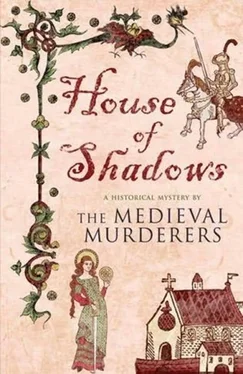‘Then you can help us. We are new to this city. My friend and I arrived only yesterday. What can you tell us about your daughter?’
‘Juliet was a good, dutiful child. Always was. I adored her. Perhaps I spoiled her, but after her mother…There was a feeling…I suppose I saw much in her that I had loved in her mother.’
‘Her mother died?’
‘She fell pregnant too soon after Juliet’s birth and died in the birthing. Perhaps it was natural that Juliet should be my most favoured child.’
‘She was your only child?’ Simon asked.
‘I have a son as well. Her younger brother, Timothy. He is some compensation to me.’
Simon wondered at that. It was a curious turn of phrase and sounded odd from this man’s mouth – but much of his tone and appearance was entirely out of keeping with Simon’s first summing-up. Clearly this man was more mentally rigorous than he would have thought.
‘We have heard – Sir Henry, I am sorry if this rakes up sadness for you, but I have to ask – we have heard that she formed a close liaison with a fellow.’
‘Who?’
‘Do you know of a man called Pilgrim?’
‘William de Monte Acuto? That little shite? Yes, she knew him.’
‘More than that? Did she know him well?’
Henry Capun’s face darkened, and a flush rose from his neck. ‘What are you saying, that my daughter was unchaste – even a whore? Do you think to insult her memory here in my house, Sir Knight?’
‘Sir Henry, I speak only what I have been told. Did you know that she was married?’
Henry Capun gaped. He took a stumbling step backwards, a hand reaching out wildly for a chair. Hurriedly Simon ran to his side, grasped a stool and thrust it behind the banneret. Capun half fell into it, his hand gripping Simon’s forearm as though it was the only thing to maintain his sanity. ‘She…no!’
‘This man Pilgrim was also murdered. His body lay only a short distance from your daughter’s. She was married at the end of November last year. I have spoken to the man of God who witnessed the ceremony. Her marriage was fully legal.’
‘My God! The bastard ! If he had left her alone, none of this would have happened!’
‘Do you think she may have married this Pilgrim?’
‘I don’t know…my God!’
‘Well, can you think of anyone who would have had cause to harm them both?’
‘Only that murderous son of a whore William de Monte Acuto, the boy’s father!’
‘Why should he want to kill them?’ Simon blurted.
‘Because he and I are enemies. I’ll have nothing to do with him, nor he with me. Christ’s bones, if he’s killed my little Juliet, I’ll have his heart!’
‘Explain, please.’
Henry scowled. He had recovered from his first shock, but he was still shaky as he reached out for a mazer of wine on the table. ‘When we were younger, William and I were friends. We were of a similar age, had similar backgrounds, and we were keen to do all we could to advance ourselves. But then I did better than him and started to win honours and money, and we lost contact. I think he blamed me for his own lack of opportunities, and that led to bad feeling. It was nothing to do with me, though. I treated him in the same way as I ever had. The trouble is, William has a lousy temper. He always did have.’
‘How did your lives change so greatly?’ Baldwin murmured.
‘William sought to advance himself early on, and he allied himself to men in the early days of the century. When the king was still a prince, William did all he could to curry favour. Meanwhile I concentrated on money and left politics alone. When I had money, I was noticed by powerful men, and they advanced my cause for me.’
Which meant that he was able to bribe the powerful to achieve what he wanted, Baldwin reckoned, while his erstwhile friend and companion languished. ‘You were allied with those who are still in power, then?’
Henry’s mouth twisted. ‘I can count the young Hugh Le Despenser as a friend. William was allied with Piers Gaveston.’
Gaveston, the king’s companion, was so detested by the barons that he was captured and hanged like a common felon in the fifth year of the king’s reign. [5]Baldwin began to understand the depths of the jealousy William de Monte Acuto might feel for this man – especially since as Gaveston’s star waned the Despensers’ waxed full mightily.
Simon was frowning. ‘You say that this man de Monte Acuto might have killed your daughter – but that hardly makes sense. Why should he kill her when the only effect of her liaison with his son was to annoy you? And why kill his own son?’
Henry looked at him for a moment. ‘Because, bailiff, he would look on any alliance with me as being a betrayal of his own honour. He hates me for all I have done.’ He looked away, closed his eyes and shook his head. ‘You see, there is one last thing I didn’t mention. The woman I married, my poor wife Cecily, I won from him. He was wooing her when I snatched her away. He has never forgiven me for her death.’
And neither have I , he added to himself.
Thursday Next after the Feast of St George the Martyr [6],
Bermondsey Marsh
The next morning was bright and clear, with only a few clouds sitting stationary over the city. Baldwin and Simon rose early, and after a light breakfast they crossed the bridge and turned left to go up to Bermondsey again.
The space about the two bodies was filled with people. There was huddled a jury of men, for the most part grim-faced at the stern duty before them, although one or two of those who were only twelve or thirteen were anxious at the sight of the coroner. People here were used to seeing the rich and powerful, but few enjoyed the sight of those who could fleece them unmercifully for any infraction.
Baldwin reckoned that the inquest itself was notable only for the severity of the coroner. In his own experience, many coroners could be too demanding, and frequently they were thoroughly corrupt, soliciting bribes to prevent a man being taken to court or demanding more to ensure that some other fellow was arrested in his place. There were any number of tricks that could guarantee a man a well-filled purse.
This man started proceedings by fining the vill because not all the men of over twelve years had appeared. Then he imposed another fine because Hob did not answer him in the required manner, apparently. Before they had reached the point at which the bodies were displayed, the jury was already cowed. Baldwin could see that their damp shuffling in the mud was stilled, and they stared at the ground with sullen resentment.
Not that the coroner minded. He appeared to relish their grim bitterness.
Soon, though, when the witnesses began to come forward, Baldwin found his attention being diverted – especially when he caught his first sight of the man he had been keen to question: William de Monte Acuto, the father of the dead Pilgrim.
To his surprise, for he had expected someone who would show the same dissipation as Henry Capun, William was a tall man with the physique of a warrior. He had the same muscled neck, powerful right arm and thick thighs as a knight. Clearly this was a man who had fought in his youth. He had a calm face, and even with sorrow marking his eyes he was still a handsome fellow, the kind of man whom women would like. There was a softness and soulfulness in his features that was attractive and spoke of an inner gentleness. It was a great shame that he had allied himself with Piers Gaveston, but, as Baldwin knew, men would connect themselves with the greatest fools and felons in order to protect themselves politically.
‘I am William de Monte Acuto.’
The coroner was questioning the witnesses in a bullying manner, as though he enjoyed cowing those who came before him. With William, he seemed a little unsure how to continue. At last he jerked his head at the woman’s body lying on the ground before them. ‘You know her?’
Читать дальше












